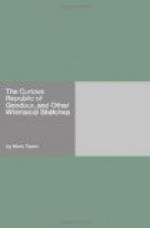But the poem I have referred to as attracting my father’s attention and achieving his favour was “Hiawatha.” Some man who courted a sudden and awful death presented him an early copy, and I never lost faith in my own senses until I saw him sit down and go to reading it in cold blood—saw him open the book, and heard him read these following lines, with the same inflectionless judicial frigidity with which he always read his charge to the jury, or administered an oath to a witness:
“Take
your bow,
O
Hiawatha,
Take
your arrows, jasper-headed,
Take
your war-club, Puggawaugun,
And
your mittens, Minjekahwan,
And
your birch canoe for sailing,
And
the oil of Mishe-Nama.”
Presently my father took out of his breast pocket an imposing “Warranty Deed,” and fixed his eyes upon it and dropped into meditation. I knew what it was. A Texan lady and gentleman had given my half-brother, Orrin Johnson, a handsome property in a town in the North, in gratitude to him for having saved their lives by an act of brilliant heroism.
By and by my father looked towards me and sighed. Then he said:
“If I had such a son as this poet, here were a subject worthier than the traditions of these Indians.”
“If you please, sir, where?”
“In this deed.”
“Yes—in this very deed,” said my father, throwing it on the table. “There is more poetry, more romance, more sublimity, more splendid imagery hidden away in that homely document than could be found in all the traditions of all the savages that live.”
“Indeed, sir? Could I—could I get it out, sir? Could I compose the poem, sir, do you think?”
“You?”
I wilted.
Presently my father’s face softened somewhat, and he said:
“Go and try. But mind, curb folly. No poetry at the expense of truth. Keep strictly to the facts.”
I said I would, and bowed myself out, and went upstairs.
“Hiawatha” kept droning in my head—and so did my father’s remarks about the sublimity and romance hidden in my subject, and also his injunction to beware of wasteful and exuberant fancy. I noticed, just here, that I had heedlessly brought the deed away with me; now at this moment came to me one of those rare moods of daring recklessness, such as I referred to a while ago. Without another thought, and in plain defiance of the fact that I knew my father meant me to write the romantic story of my half-brother’s adventure and subsequent good fortune, I ventured to heed merely the letter of his remarks and ignore their spirit. I took the stupid “Warranty Deed” itself and chopped it up into Hiawathian blank verse without altering or leaving out three words, and without transposing six. It required loads of courage to go downstairs




